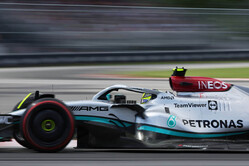


18/06/2022
NEWS STORY
 Red Bull boss, Christian Horner describes the FIA's new technical directive "unfair", insisting that it is wrong to change the rules mid-season to effectively benefit one team.
Red Bull boss, Christian Horner describes the FIA's new technical directive "unfair", insisting that it is wrong to change the rules mid-season to effectively benefit one team.
The Briton was speaking as seven-time world champion labelled his opening day of practice a "disaster", effectively writing-off this season and even casting doubt on next year also.
Thursday's announcement by the FIA that it is to introduce a metric aimed at minimising porpoising is effectively all about safety following the scenes in Baku a week ago, most notably Hamilton's difficulty in getting out of his car after taking a pounding for over ninety minutes.
Mid-season rule changes are only allowed on safety grounds, but as far as some are concerned, most notably Red Bull, it's about performance, for the issue can be resolved simply by raising the car's ride height, but this would compromise its pace.
"To drop a technical directive like that, just as we're coming into a weekend without any consultation, it just feels the wrong way to be going about things," he told Sky Sports.
"There needs to be proper consultation with the experts and a solution can be found," he added.
"It's the same rules for everybody," he continued. Some cars have the issues, some cars don't. For the ones that don't inevitably there will be a push to try and get the regulations changed. That's the nature of the game, that's the nature of Formula 1.
"It would be unfair to have effectively what would be deemed a regulation change halfway through a year because a team has missed a target," he insisted.
"The emphasis should be on that team to sort that issue out. If the car is dangerous, that's down to the FIA, they still have a black flag in their armoury. If they deem a car is dangerous or unacceptable for a driver's safety, they would and should black flag it.”
In terms of the metric, which now looks likely to be introduced at Silverstone, like most things mandated by the FIA, Horner wonders how it will be policed.
"I don't know who dictates what your rear ride height is, for example," he said. "Or what level of porpoising is acceptable and what isn't.
"If the wind changes, it has an effect. How do you police it?
"We're not saying it's the wrong thing to do, we're just saying that perhaps it needs a little more discussion before implementation."
In terms of the policing, Toto Wolff agrees.
"I think sometimes we need to not over complicate the situation,” said the Mercedes boss, according to Motorsport.com. "Measuring frequency can lead to very controversial situations, or assessments.
"Would you disqualify a car that you deem to be bouncing too much and get a win out of him? I doubt you would do that. So all teams have to stick their head together with the FIA and say 'what can we do' in order to get this under control.
"The point is that cars bounce at various stages through the weekend, we have sessions where we don't bounce," he admitted. "Fuel, no fuel, wind, headwind, tailwind, grip levels... So I think it will be very difficult to say in one session you're bouncing too much. And what do you do in the race then?
"You could have a day that you're doing perfectly fine and you don't see high amounts, and the next day, you have a bouncing car. I think what needs to be acknowledged is ground effect cars are a problem. And we need to tackle that."
For someone only too eager to share his opinion on gimmicks like reverse grids and Sprints, Ross Brawn, the man who spearheaded the rules overhaul, has been remarkably silent of late. We wonder why.